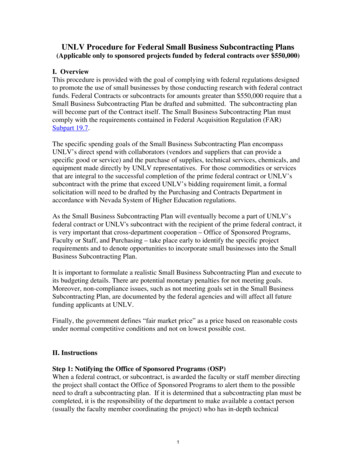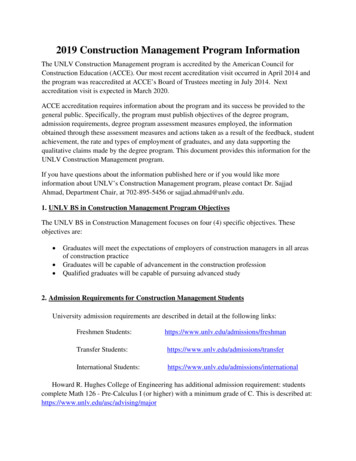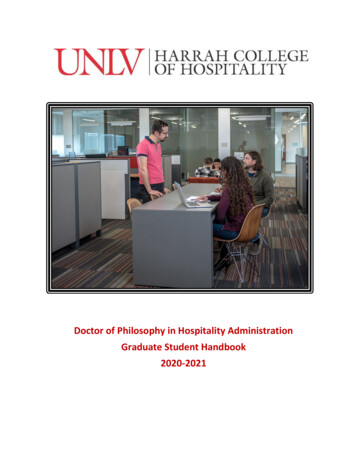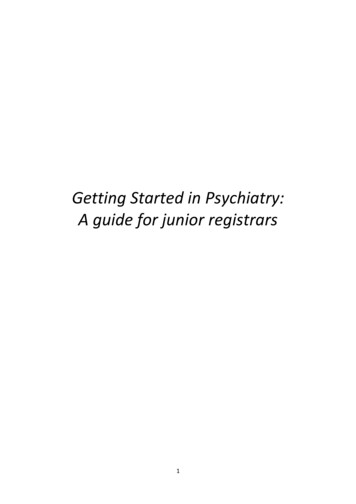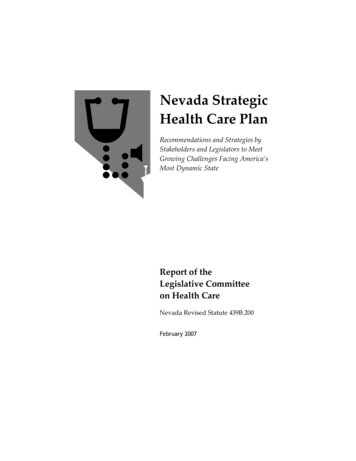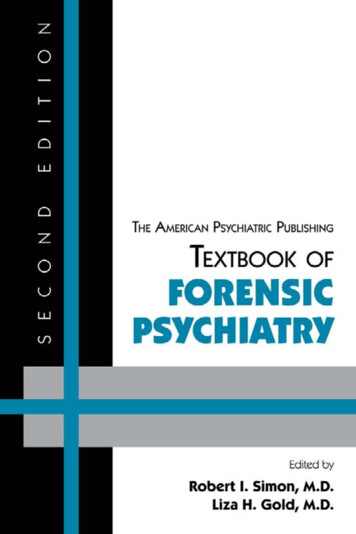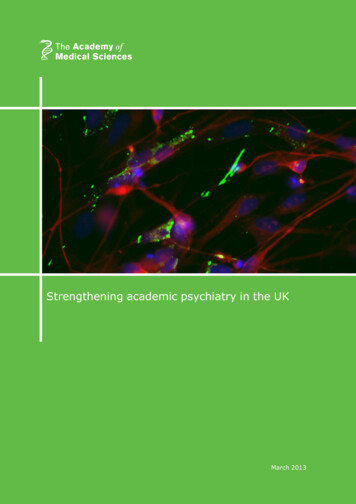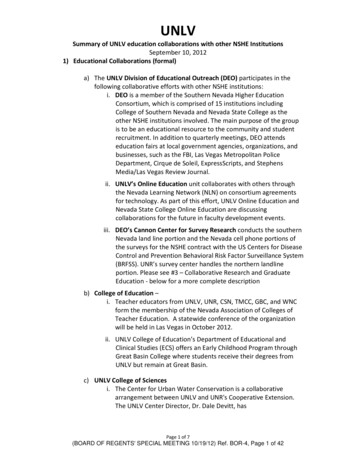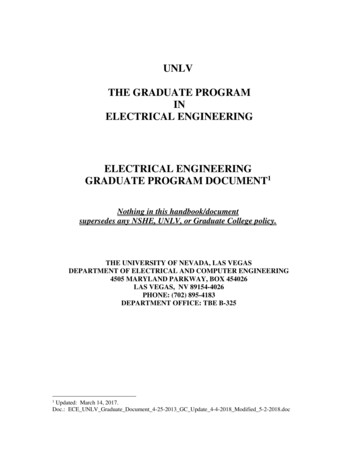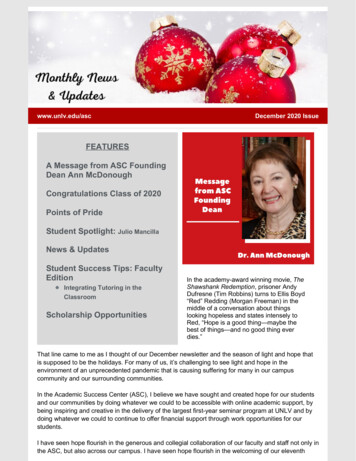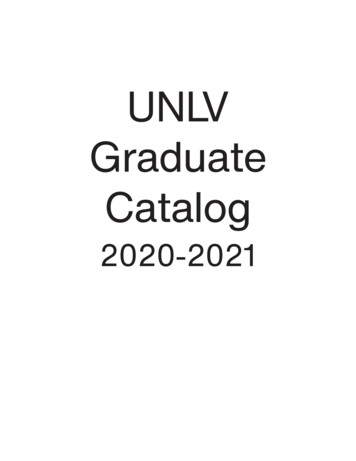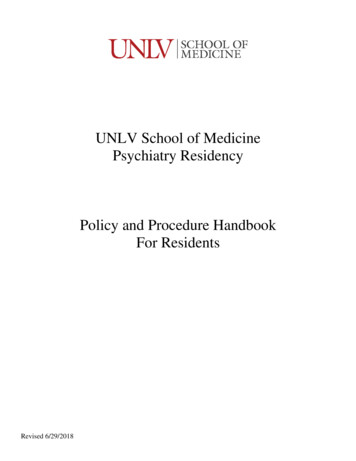
Transcription
UNLV School of MedicinePsychiatry ResidencyPolicy and Procedure HandbookFor ResidentsRevised 6/29/2018
Table of 343637383940415160General Competencies of Residency TrainingGeneral Competencies DefinedProgram Mission and GoalsProgram DescriptionSelection and Admission ProceduresResident ResponsibilitesCode of Professional ConductLeave PolicyResident Duty Hours and Call ResponsibilitiesTransition of Care/Handoff PolicyMoonlighting PolicyResident LogExperiential ChecklistsSupervision PolicyPsychotherapy Training RequirementsSite Standards for Inpatient Resident TrainingSite Standards for Outpatient Resident TrainingChief Resident PositionDuties of Chief ResidentResearch PolicyResidency Training Committee and Competence CommitteePEC Standing AgendaProgress Review MeetingsEvaluation, Advancement, and DismissalInstructions to Examiners for Conducting Comprehensive Oral ExaminationClinical Skills Certification Examination PolicyEssentials and Special RequirementsQuality AssuranceInfection Control PolicyAppendix A – Goals and Objectives of RotationsAppendix B – Goals and Objectives of Didactics CoursesAppendix C – FormsResident Applicant EvaluationPGY – Supervision Level Assessment FormOff- Site Supervision FormAttending Evaluations of Resident – Rotation SpecificResident Assessment by non-MD Professional (360 Evaluation)Patient Assessment of ResidentResident Self-AssessmentResident to Resident (360)Resident Semi-Annual EvaluationResident Assessment of ProgramResident Assessment of Faculty and RotationSeminar EvaluationJournal Club EvaluationCase Conference EvaluationTraining Skills Checklist for PGY-1 and PGY-2Training Skills Checklist for PGY-3Resident Log FormClinical Skills Certification Examination FormComprehensive Oral Examination Form2
Resident Research/Academic Project FormResident Initial Leave Request FormIPad Agreement126168169Appendix D – ACGME Requirements for Graduate Medical Education in PsychiatryAppendix E – Street Terms (White House Drug Policy)Appendix F – Graduate Medical Education Resident Handbook3
General Competencies of Residency TrainingThe objectives are similar among all programs. The means by which the objectives are achieved will vary. Achievementof objectives will be time sensitive; namely, that only a limited number can be addressed over time, in sequence.Programs shall evaluate and qualitate the degree to which residents understands and/or practice the following:For Patient Care:·······The performance of patient history and physical examinations, particularly interviewing techniquesThe technical skills required by the programDeductive reasoning in the management of patientsConstructing meaningful management plansTechniques related to counseling, instructing and teaching patients about their clinical conditionHealth promotion and maintenance and disease preventionResponsibilities as a collaborative member of the health care teamFor Medical Knowledge:···Core factual medical knowledge, illness/disease basedAnalytic and deductive reasoningApplications of basic scienceFor Practice Based Learning:·Use of scientific evidence: evidence based medicine and outcome of practice as a guide to standards of caredevelopment, i.e., best practices····Self-evaluation of practice experienceStatistical methodsUse of informational technologyInteraction with others in learning and teachingFor Interpersonal and Communication Skills: patients, peers and colleagues···Listening and language skillsAttentiveness, interestComprehension and self-awareness of patient/physician interactionFor Professionalism: among all parties in the health care environment·····Respect, understanding, sympathy, empathySensitivity to varied cultures and national originsAwareness of issues related to age, gender, religion and disabilityEthical and legal preceptsCollaborative attitudes with peers and associatesFor Systems Practice:··Operation and goals of health care systems and managed careAwareness of cost effective practices, resource alternatives, and risk/benefit considerations4
··Patient management and therapeutic alternativesPatient advocacy issues5
General Competencies DefinedA.Patient Care1.Procedures: routine history and physical, technical skills performance2.Interview techniques3.Informed decision making4.Management plans5.Health promotion, maintenance, disease prevention6.Team workB.Medical Knowledge1.Core factual cognitive knowledge relative to the scope of medical practice, illness and disease2.Analytic and deductive reasoning3.Basic science applicationsC.Practice Based Learning1.Use of scientific evidence and practice based experience: evidence based medicine2.Resident self- evaluation and analysis of experience, patient care3.Understanding and applying statistical methods4.Use of informational technology5.Facilitation of the learning and teaching of othersD.Interpersonal and Communication Skills1.Listening and speaking skills2.Understanding and attentiveness; self-awareness; comprehension of interactions with patients3.Establishing a physician/patient relationshipE.Professionalism: patients and colleagues1.Respect, understanding, sympathy, honesty2.Cultural sensitivity3.Age, gender, disability awareness4.Ethical and legal practices5.Collaboration and sharing with peers and associatesF.Systems Based Practice1.Understanding health care operations and goals2.Awareness of resources and cost effectiveness and risk/benefit concerns3.Management and therapeutic alternatives in managed care environments6
Program Mission and GoalsThe UNLVSOM Psychiatry Residency Program focuses upon the education of clinically competent and ethicalpsychiatrists. The resident is expected to understand and appreciate the complex interactions between the biology, thepsychology, the social context and the spiritual perspectives of each patient interaction. A wealth of clinical material isprovided in varied clinical settings throughout the residency.Goals for each rotation and for the residency in general are defined according to the ACGME standards of competence.I.II.III.IV.V.Patient Care:A.Residents will demonstrate excellence in completing the psychiatric evaluation, mental status examinationand case formulation.B.Residents will integrate information accurately to then recommend appropriate intervention from the biopsychosocial model, utilizing each of the areas within this model.C.Residents will demonstrate thorough and empathetic interview skills.D.Residents will diagnose patients using the rules as written in the DSM-5, and generate an appropriatedifferential diagnosis.Medical Knowledge:A.Residents will demonstrate acquisition of factual and theoretical knowledge within psychiatry by meansof scoring in the top 2/3s of peer groups on the PRITE examination.B.Residents will demonstrate understanding of illness states and current appropriate interventions for theillness state being treated.C.Residents will present current research utilizing critical reasoning skills.Practice Based Learning:A.Residents will utilize both medication and psychotherapy appropriately.B.Residents will articulate the current best practices standard for specific illness states.C.Residents will appropriately describe risks and benefits to patients.D.Residents will understand their limitations and demonstrate appropriate referral and/or consultation.Interpersonal Communication Skills:A.Residents will communicate effectively with both patients and families using appropriate techniques andempathy.B.Residents will present cases completely and concisely to attending and colleagues.C.Residents will chart effectively, appropriately, and completely.D.Residents will actively participate in medical student education.Professionalism:7
VI.A.Residents will understand, respect, and advocate the fiduciary responsibilities of a psychiatrist.B.Residents will demonstrate respect for each patient and that patient’s family system, ethnic system andcultural system.C.Residents will be prompt, reliable, timely, honest, altruistic and trustworthy in all encounters with bothpatients and fellow professionals at all institutions.D.Residents will adhere to principles of confidentiality.Systems Based Practice:A.Residents will experience and understand the provision of healthcare from a variety of systems: publicsector, private, managed care.B.Residents will understand the regulatory aspects of patient care, and conform to the appropriate standard.C.Residents will demonstrate appropriate decision making capacity regarding the admission and dischargeof patients to and from specific levels of care.8
Program DescriptionPGY-1: Half of this year of training provides the resident exposure to general medical rotations: one month of internalmedicine inpatient, one month of emergency medicine, two months of family medicine, and two months of neurology.These rotations are focused upon learning the interaction of medical conditions with psychiatric presentations. Inaddition, the resident will hone general medical skills. The other half of the year provides basic inpatient psychiatryexperiences at Southern Nevada Adult Mental Health Services where there is diagnosis and treatment of a wide range ofpsychiatric illness.Successful Completion: Complete each rotation, meeting expectations on each area of evaluations, completion of step 3 ofthe USMLE/COMLEX.PGY-2: Inpatient psychiatry is provided at the VA hospital, where geriatric evaluation and treatment is provided inaddition to substance abuse/dependence and general adult psychopathology.Seven Hills provides substance abuse/dependence experience.UMC and Montevista provide a wide range of experience with the assessment and treatment of children and adolescentpatients, with substantial contact with family systems. Consult and Liaison psychiatric experience is provided atUniversity Medical Center. UMC also has a small emergency holding area, and substantial experience evaluating andinitiating treatment in this setting helps clarify diagnostic questions related to substance induced or medically inducedpsychiatric conditions. Experience is gained in identifying symptoms of acute intoxication from substances of abuse,providing detoxification, and identifying aftercare options.SNAMHS : Assessment and triage skills are emphasized during the two month rotation at the SNAMHS crisis observationunit.Successful Completion: Complete each rotation, meeting expectations on each area of evaluations, successful completionof 3 CSV Exams, completion of clinical checklist form for PGY- 1 and PGY- 2, approved academic project formcompleted and completion of one comprehensive oral examination. Complete all 12 modules from online NEIpsychopharmacology program.PGY-3: The third year of training focuses upon the outpatient treatment experience. The resident is assigned to the VAoutpatient clinic, SNAMHS outpatient clinic, Healthy Minds outpatient clinics and UNLV Student Wellness Clinic.Residents gain experience in making decisions regarding psychopharmacology, and focus psychotherapy skills incognitive therapy, supportive therapy, psychodynamic therapy, interpersonal therapy, group therapy and family/couplestherapy.Successful Completion: Complete each rotation, meeting expectations on each area of evaluations, completion of clinicalchecklist form for PGY- 3, completion of second comprehensive oral examination, completion of formal QI project.PGY-4: Additional time is spent at SNAMHS/ VA/ Dr. Rosenman seeing longitudinal psychotherapy patients and doingelectives. The resident may act as a “junior attending” in the administrative psychiatry rotation on the UMC consult team,or other clinical services.Successful Completion: Complete each rotation, meeting expectations on each area of evaluations, and completion of 3rdcomprehensive oral examination, completion of research project.Didactic time is protected and free of clinical duties. This is scheduled for Wednesdays from 8:00 AM 4:00 p.m.9
Selection and Admission ProceduresThe process of selecting candidates for the Residency Training Program is personally supervised by the Residency TrainingDirector on an ongoing basis. Preliminary selection decisions are made by the Program Coordinator, based upon the enclosedpolicies. Final selection decisions are made by the Residency Training Committee. The purpose of the admission procedures isto select candidates with exceptionally strong academic records and interpersonal skills, who have the potential of becomingsuperior psychiatrists and of making significant contributions to the field.A.B.C.D.E.Response to Requests for Information1.All medical students and physicians or international graduates who have passed Parts I and II of the USMLE,COMLEX, National Boards, or FLEX examinations desiring information about the program may access ourweb site by clicking on the Graduate Medical Education link at sted medical students and physicians are encouraged to phone the Program Coordinator if furtherinformation is desired. (702) 671-5127.3.Applications to our program are conducted electronically or in written form through the Electronic ResidencyApplication Service (ERAS) of the Association of American Medical Colleges, 2450 N. Street, N.D.,Washington, D.C. 20037. .Information may be obtained through their web page: www.aamc.org/eras.Selecting Candidates for Interviews1.Applications are screened by the Program Coordinator for (a) completeness, (b) qualifications for licensing, (c)special experience and training which the candidate may have had (e.g., special internships, clinical or researchexperience), and (d) strong grades and/or letters of recommendation.2.The Residency Director, who subsequently selects candidates to be invited for a formal interview, reviewsapplications of qualified candidates.Interviews1.At least two faculty members and one resident interview applicants, although the residentinterview may be informal.2.Each interviewer rates the applicant in terms of general acceptability and academic, clinical, and psychologicalpotential. Written impressions and observations of applicants are sent to the Program Coordinator.Ranking1.All interviewed candidates are presented to the selection subcommittee of the Residency Training Committee.Committee members review applications and interview reports, and discuss each candidate before rankingcandidates. The Committee may request additional information or invite a candidate for a second interview.Alternative Procedures1.Occasionally positions will become available in any training year. Interested candidates are asked to providethe information described above, as well as a letter from their training director elsewhere. After two brieftelephone interviews by full time faculty (optional), a discussion will be made regarding an invitation tointerview. Interviews will be conducted following the protocol outlined above.2.A transferring resident should be appointed at the PGY level (and corresponding salary level) which representshis or her residency level in the University of Nevada program. Previous residency training will not be a factorunless credit is granted toward completion of the Las Vegas, Nevada program. The Residency Directordetermines credit for previous training based upon specialty board requirements. The following is an example:A transferring resident in psychiatry has had a previous year of residency training in family practice. TheResidency Director determines that 6 months of the previous training may be credited toward completion ofour 4-year psychiatry program.10
Resident ResponsibilitiesA.Lifelong learning begins in medical school, progresses throughout residency, and continues throughout life. Aself directed program of self-study is necessary at each of these levels of education.B.Residents much each own (at bare minimum) the following texts:1.“APA Textbook of Clinical Psychiatry,” latest edition2.“Essential Psychopharmacology: Neuroscientific Basis. . .” by Steven Stahl, latest edition3.“Psychodynamic Psychiatry in Clinical Practice” by Glen Gabbard, latest edition4.“Systems of Psychotherapy” by Prochaska, et al., latest edition5.“DSM-5,” American Psychiatric Association Press******some of these will be available via Psychiatry Online, you are responsible for the othersC.Residents should also plan to own a truly encyclopedic text such as “Kaplan and Sadock’s ComprehensiveTextbook of Psychiatry.” Although a difficult read, this is a standard reference text for basic knowledge.D.Residents must attend and participate in at least 90% of lectures. Exceptions to attendance are limited to vacation,serious illness, or patient emergency (which can’t be handled by the attending on the service.) Class time is fullyprotected and general clinical duties should never interfere with scheduled courses or supervision.E.Residents must participate in medical student education: this includes rounding with medical students, informalfeedback to students, completion of medical student evaluations in One45, and formal lectures to groups ofmedical students.F.Residents are to provide quality, compassionate, cost effective, and respectful care to patients.G.Residents must strictly adhere to the policies of medical practice at each participating hospital. Records must becompleted in a timely manner.H.Residents must provide complete, prompt, and clear documentation of all aspects of patient care. Residents mustcountersign all medical student notes.I.Residents must participate in at least one hour of onsite clinical supervision each week, and must participate inone hour of off-site clinical supervision each week.J.Residents must provide 60 - day advance notice to any institution regarding vacation time or education time awayfrom the work site. After institutional approval, leave slips must then be signed by the chief resident thenprogram director. The chief resident will ensure that multiple vacation requests do not impact clinical servicesprior to approving the request.K.Residents must notify both the clinical site and the residency coordinator of illness requiring sick leave or anyabsence due to medical condition.L.Residents must maintain a written log of all patients seen, demographics regarding the patient, all diagnoses ofpatient, and treatment modalities used in the care of the patient (psychiatric services only.)M.Residents must document complete H&Ps, daily progress notes, complete off-service notes, and provideappropriate sign-outs to fellow residents and/or attending’s.N.Residents will dress and act appropriately and professionally in all clinical venues and during didactics days.Residents will maintain professional behavior and conduct consistent with professional obligations on and offclinical services.11
O.Residents will respond rapidly to pages. Residents are to be available by pager routinely from8 AM through 5 PM on all weekdays, and additionally for any time period the resident is designated as being oncall for an institution.P.Residents will notify the chief resident of emergencies that prevent them from taking an assigned call. Residentswill make every attempt to find coverage for themselves should illness or emergency situations arise; only if theresident is unable to find reasonable coverage, the Chief Resident will assign another resident to provide callcoverage, but the resident may be required to “make up” more than one call to discourage this practice.Q.Residents must fulfill call obligations as scheduled.R.Residents must critically evaluate themselves, their students, their attending’s, their supervisors, their rotations,other residents, and the residency in general.S.Residents must understand the importance of proper sleep and how tiredness can affect clinical skills. Residentsmust take responsibility for obtaining adequate rest each night.12
UNLVSOMCode of Professional ConductStandard of conductThe UNLV/ School of Medicine is committed to an environment of mutual respect. All members of the medical schoolcommunity are expected to maintain a positive learning environment in which students, faculty, staff and residents treateach other with respect. Members of the community, including institutional leaders, will not tolerate harassment,intimidation, exploitation and/or abuse.Purpose of policyThis policy is intended to define inappropriate conduct in relationships with students. It also describes the mechanismthrough which medical students can report violations without fear of retaliation. This policy ensures access to educationalprograms that prohibit student mistreatment. For the purposes of this policy, community is defined as all sites whereUNLV/ School of Medicine students receive training.Promoting a Positive Learning EnvironmentUNLV School of Medicine provides ongoing educational and developmental opportunities to promote a positive learningenvironment respectful of all individuals. The policy will be included in both student and resident handbooks, and will beposted on the medical school website. The topic will be addressed annually throughout medical school.Residents: The policy will be included in the resident handbook, and will be addressed at resident physician orientationsessions.Faculty: The policy will be distributed electronically by the Dean to all faculty members, including adjunct and volunteerfaculty. The message will include resources for identification and prevention of mistreatment and abuse, as well asinstructions to report suspected actions and resources for resolution of alleged occurrences.Nursing and Other Clinical/Support Staff: A letter will be sent from the Dean to the Chief Executive Officer at affiliatedinstitutions requesting distribution of the policy to all staff interacting with medical school students. Resources will beavailable for presentations on the topic to various groups at the training sites.A website is available for reference by students, residents, staff and faculty The policy will also be attached to affiliationagreements with all community partners. treatment of students may occur in many forms and can seriously impair theeducational experience. Types of mistreatment include verbal, hierarchical/power, ethnic or cultural, physical,discrimination, and sexual harassment.Specific examples of mistreatment include but are not limited to:·······Yelling at and/or verbally berating a student in public or privateActions that can reasonably be interpreted as demeaning or humiliating (harsh criticism can be very appropriate ina life and death situation)Assigning duties as a means of punishing students instead of for educational benefitsUnwarranted exclusion from learning opportunitiesThreats to fail, assign a lower grade or give a poor evaluation for inappropriate reasonsRequesting that students complete personal chores or errandsUnwelcome sexual comments, jokes, innuendo or taunting remarks about a student’s physical appearance, age,gender, ethnicity or culture, sexual orientation/identity or marital status13
·Intentional physical contact such as pushing, shoving, slapping, hitting, tripping, throwing objects or aggressiveviolation of personal spaceProcedure for ResolutionPlease note that all complaints of sexual harassment and’/or discrimination will be referred to Office of AffirmativeAction on the University of Nevada, Reno campus.Informal Resolution· Students are encouraged to first utilize any of the informal mechanisms listed below when possible.o Direct discussion between student and alleged offendero Discussion with course or clerkship coordinatoro Discussion with UNLVSOM Personnelo Fully utilize the resident and faculty evaluation process.Formal ResolutionWhen the informal mechanisms mentioned above do not lead to resolution of the incident or behavior, the followingprotocol will be followed:·If the incident involves an allegation of mistreatment by a student, the incident will be referred to UNLVSOMPersonnel·http://www.·If the incident involves an allegation of mistreatment by a resident, due process provisions in the ResidentHandbook will be referred to UNLVSOM Personnel·If the incident involves an allegation of mistreatment by a faculty or staff member, the incident will be referred tothe Administrative Code pursuant to Ch. 6.7.1 of the NSHE Code RetaliationRetaliation against students reporting mistreatment is regarded as a form of mistreatment and will not be tolerated.Accusations that retaliation has occurred will be handled in the same manner as accusations concerning other forms ofmistreatment.Malicious AccusationsA complainant or witness found to have been dishonest or malicious in making the allegations or at any point during theinvestigation may be subject to disciplinary action.Campus ResourcesThe following campus resources may be helpful sources of information or support in dealing with mistreatment or abuseissues: UNLVSOM Personnel14
Leave PolicyI.Sick LeaveA.All residents receive 15 days of paid sick leave (which will be based on a five day work week) during theinitial 12 months of service. Beginning 12 months after the starting date of the contract, the resident willbegin to accrue additional sick leave at a rate of 1-1/4 days per full month of service to add to anyremaining balance of unused sick leave from the first 12 months of service. Sick leave may be accruedfrom year to year not to exceed 15 work days at the last day of each month.B.If a sick day is necessary, the resident is required to notify the clinical supervisor and the ResidencyCoordinator prior to his/her scheduled start time. If the resident requires more than one day off due toillness, he/she is required to notify the clinical supervisor and the Residency Coordinator each day.Failure to do so may result in disciplinary action.C.If a resident is out for longer than 3 days, please have them contact : Maria Langely: Maria.langley@unlv.edu II.Or Kelly Scherado: Kelly.Scherado@unlv.eduD.Sick days are for use only in the case of a scheduled physician or dentist appointment, or on those days inwhich the resident is so physically ill that getting out of bed would be nearly impossible. This degree ofillness suggests a severity that would require an appointment with a licensed physician in the communityfor evaluation and treatment.E.As physicians, our primary duty is to our patients, both legally and ethically, and by extension, the servicewhere duties to patients are provided. Minor illness such as a cold or aches and pains are not severeenough for a physician to fail to perform the primary role of patient care.F.Sick day usage will be carefully monitored. Should a pattern of sick days be identified, or if excess daysare taken in a particular month, rotation or year, the department will require a note from a communitybased physician (neither resident, nor University, nor friend) on a daily basis for each sick-day requestedfrom that point forward.G.Sick days are not for use as general leave days, nor may they be used to extend a scheduled vacation oreducational leave.H.Abuse of the sick day policies will result in the days being ruled as unexcused absences and will requiremake up days prior to graduation from residency, as required by the ACGME. In addition, abuse ofsick day policies may result in disciplinary action as a failure of professional conduct through theUniversity of Nevada.Annual LeaveA.All residents will receive 15 days of annual leave at the start of each PGY, which will be based on a fiveday work week during the academic year. Unused annual leave may NOT be carried forward to the nextyear. No sick day can be used before or after annual leave. If you do call in sick, the department willrequire a note from a community based physician (neither resident, nor University, nor friend)B.If a scheduled vacation includes a national holiday, no additional time will be given for that holiday.Holidays will be balanced by the Program Director in a fair and equitable manner.C.Residents must provide 60 days advance notice to any institution regarding vacation time away from thework site. After obtaining written approval from the clinical supervisor, the resident must turn in theleave slip to the chief resident, who will verify that no other resident or attending has leave approval15
during the same time period. The chief resident will then submit the leave slip to the Program Directorfor signature, and a copy of the approved leave slip will be given to the resident.III.D.It is the resident’s responsibility to insure that all call responsibilities are covered during his or herabsence.E.Unused annual leave will NOT be carried forward to the next training year.Educational LeaveA.All residents will receive 5 days of educational leave at the start of each PGY, which will be based on afive day work week during the academic year.B.This time may be used to attend an educational conference or to study for and/or take examinations.C.If the resident uses the time to attend a conference or workshop, he/she will be required to bring in proofof attendance, such as an airline itinerary, conference registration payment receipt, and/ormaterials/handouts from the conference.D.Residents must provide 60 days advance notice to any institution regarding education time away from thework site. After obtaining written approval from the clinical supervisor, the resident must turn in theleave slip to the chief resident, who will verify that no other resident or attending has leave approvalduring the same time period. The chief resident will then submit the leave slip to the Program Directorfor signature, and a copy of the approved leave slip will be given to the resident.E.It is the resident’s responsibility to insure that all call responsibilities are covered during his or herabsence.F.Unused educational leave may NOT be carried forward to the next training year.16
Resident Duty Hours and
The UNLVSOM Psychiatry Residency Program focuses upon the education of clinically competent and ethical psychiatrists. The resident is expected to understand and appreciate the complex interactions between the biology, the psychology, the social context and the spiritual perspectives of each patient interaction. A wealth of clinical material is
